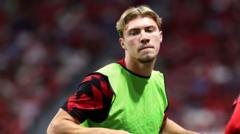“Rasmus Hojlund will not feature in Manchester United’s lineup this Sunday.” This decision has sent shockwaves through the football community, particularly as the club prepares for a critical Premier League clash against Arsenal at Old Trafford. Hojlund, a highly anticipated signing, was expected to make a significant impact this season. His absence raises questions about the team’s strategy and depth, especially against a formidable opponent like Arsenal. Fans and analysts alike are left wondering how this will affect the dynamics on the pitch and whether United can secure a vital victory without their new star striker.
As Manchester United gears up for this pivotal match, the stakes could not be higher. The team has struggled to find consistency this season, and the pressure is mounting on both the players and the coaching staff. Hojlund’s exclusion is not merely a footnote; it highlights potential issues within the squad, including injuries and tactical choices. The ramifications of this decision could resonate throughout the remainder of the season, influencing not just this match but also the broader ambitions of the club. Will Manchester United rise to the occasion, or will they falter in the face of adversity?
The Impact of Hojlund’s Absence
Rasmus Hojlund’s absence from the squad is a significant blow for Manchester United, particularly given the expectations surrounding his performance this season. The young striker has been touted as a future star, possessing the skills and potential to transform the team’s attacking capabilities. His exclusion raises immediate concerns about the effectiveness of the current lineup. Without Hojlund, the team may struggle to maintain the offensive pressure needed to compete with Arsenal, known for their strong defensive organization.
In the previous matches, Hojlund had begun to establish a rapport with his teammates, particularly in the attacking third. His ability to create space and draw defenders has been instrumental in opening up scoring opportunities for others. The dynamics of the squad will inevitably shift in his absence, requiring other players to step up and fill the void. This scenario could lead to a more conservative approach from the coaching staff, potentially stifling the team’s creativity and fluidity on the field.
Furthermore, the psychological impact of Hojlund’s absence cannot be overlooked. The young striker’s presence on the pitch often instilled confidence among his teammates. Now, with his sidelining, the remaining players may feel increased pressure to perform, which could lead to anxiety and mistakes during crucial moments in the match. This situation underscores the importance of squad depth and resilience, qualities that will be tested as Manchester United faces a challenging opponent.
Strategic Adjustments for Manchester United
In light of Hojlund’s absence, Manchester United’s coaching staff will need to make strategic adjustments to their game plan. The team may opt for a different formation or tactical approach to maximize their chances against Arsenal. One possibility is to shift to a more traditional 4-4-2 formation, allowing for two strikers to play alongside each other. This could help maintain offensive pressure, even without Hojlund’s unique skill set.
Another potential adjustment could involve leveraging the pace and creativity of existing players. United may choose to focus on wing play, utilizing their wide players to stretch Arsenal’s defense. This approach could create space for midfielders to exploit, allowing the team to maintain attacking momentum. However, this strategy requires precise execution and coordination, particularly against a disciplined Arsenal side.
Additionally, the coaching staff must consider the psychological aspect of the game. Instilling confidence in the players who will take on additional responsibilities is crucial. The team’s morale can significantly influence performance, especially in high-stakes matches. By fostering a positive mindset and encouraging players to embrace their roles, Manchester United can mitigate some of the challenges posed by Hojlund’s absence.
Fan Reactions and Expectations
The reaction from fans regarding Hojlund’s exclusion has been mixed, reflecting a blend of disappointment and concern. Many supporters had high hopes for the young striker, viewing him as a pivotal figure in the team’s ambitions this season. His absence during such a critical match has left fans anxious about the team’s prospects against Arsenal.
Social media platforms have been abuzz with discussions about the implications of Hojlund’s absence. Some fans express optimism, believing that the remaining squad members have the talent and capability to secure a victory without him. Others, however, voice their frustrations, citing the need for stronger squad depth and better injury management. This sentiment underscores the growing expectation for the club to invest in additional talent to bolster the team.
Ultimately, the fans’ expectations will hinge on the team’s performance in this match. A strong showing against Arsenal could alleviate concerns and reaffirm the squad’s potential, while a lackluster performance may intensify calls for changes within the club. The pressure is on Manchester United to deliver results, not just for their standings but also to maintain the faith of their loyal supporters.
Looking Ahead: the Season’s Prospects
As Manchester United navigates the challenges posed by Hojlund’s absence, the broader implications for the season remain to be seen. The club’s ability to adapt and respond to adversity will be crucial as they aim for a successful campaign. With several key fixtures on the horizon, maintaining momentum will be essential for their aspirations.
Injuries and squad depth will continue to play a significant role in shaping the season. The coaching staff must ensure that they are prepared to make necessary adjustments, whether through tactical changes or by integrating younger players into the lineup. This adaptability will be vital in maintaining competitiveness in the league.
Moreover, the club’s management will need to assess their transfer strategies moving forward. The absence of a key player like Hojlund highlights the importance of having a robust squad capable of weathering injuries and other challenges. Investing in additional talent or focusing on player development could be essential for the team’s long-term success. The decisions made in the coming weeks will have lasting effects on Manchester United’s trajectory this season and beyond.


